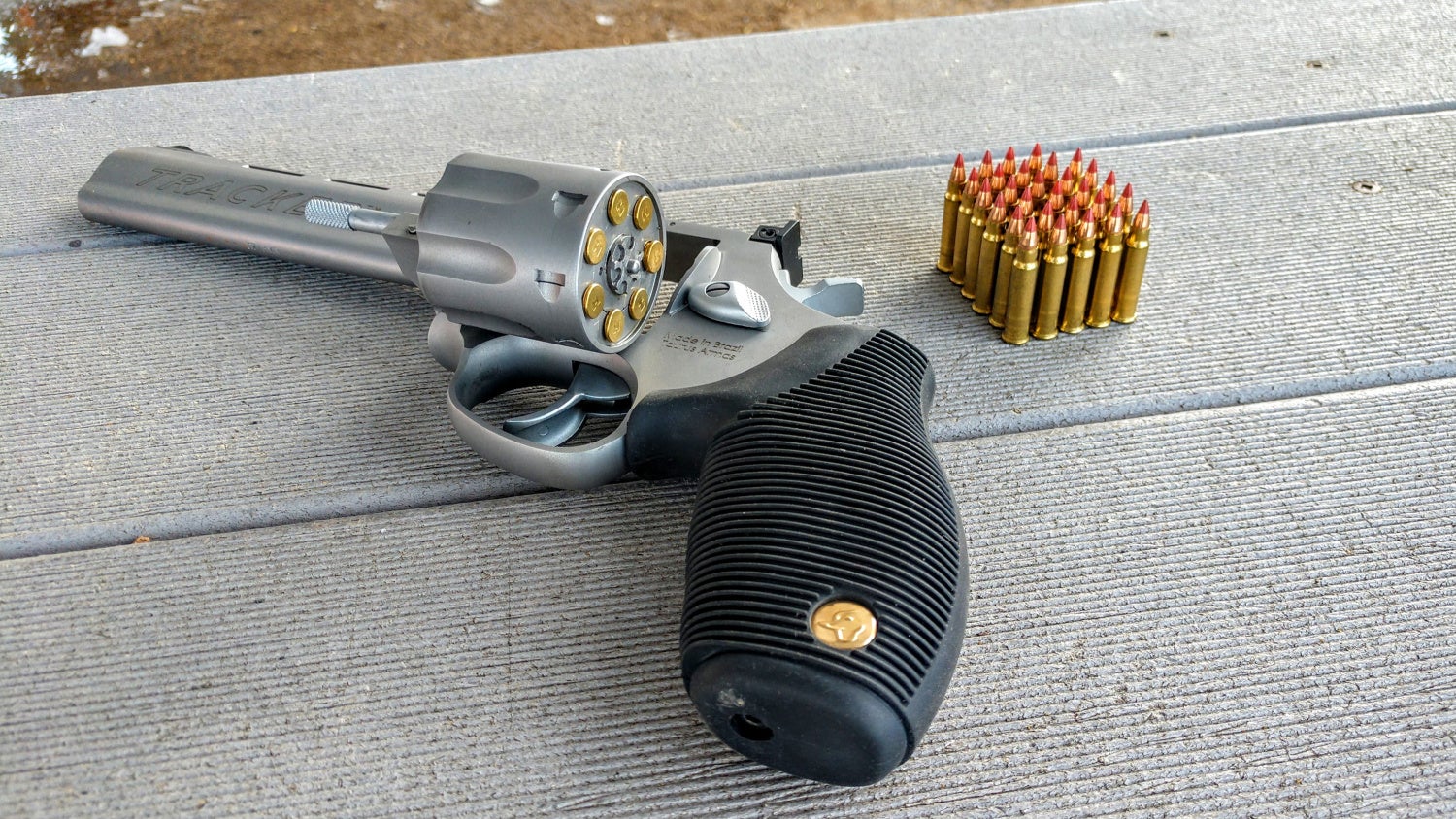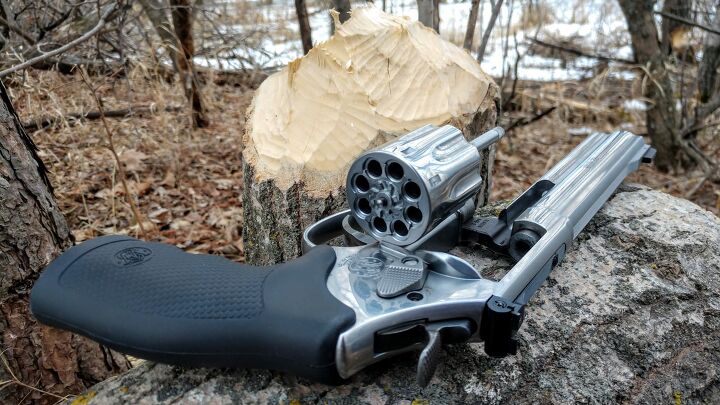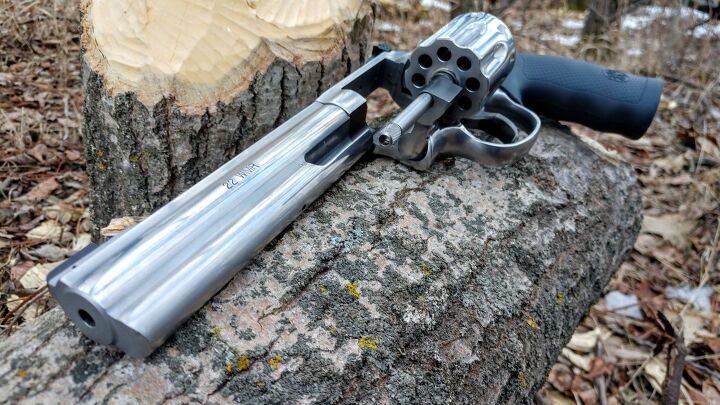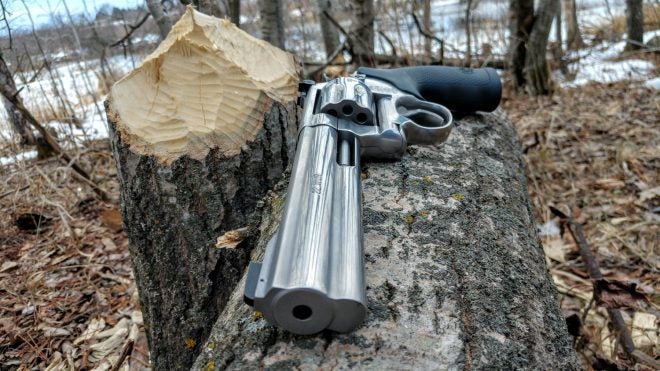Revolvers can be deployed for a multitude of applications from self-defense, target shooting, hunting, and simply for the pure enjoyment of firing them. A smaller niche that some sportsmen/sportswomen might be shopping for is pest control. We are swiftly approaching the colder winter months where squirrels, mice, and even larger furry, nuisance-makers like beavers are getting to be really busy (and invasive). So, if you need to dispatch some intruders on your property, or ones that are attempting to burrow, gnaw, and/or ruin your house or shed… what do you want to look for? Let’s take a look at different attributes you should be eyeing if you are digging into your personal stash or contemplating a new purchase entirely.
Pest Control Revolver: cartridge size
I can already hear the “bigger is better” crowd starting to get raucous and excited to jump in the Comments section, but this is a discussion that they need to sit down for. If you’ve got mice in your shed or beavers knocking down important tree cover on your property the appropriate response isn’t to borrow your buddy’s .500 S&W Magnum as cool as that idea may sound. Big-bore cartridges for tiny critters have an extremely high risk with low reward. Maybe you shoot that 7 Lbs squirrel that keeps chewing on your cedar siding once and for all!… Maybe you shoot an enormous hole in the eve of your roof and now you have some explaining to do to your spouse…
If we are going to use the admittedly-vague, blanket term of “varmint” you really should be looking at rimfire cartridges. Yes, they are higher velocity than most people realize and can ricochet a long ways, but small rounds leave small holes. There is less likelihood you mistakenly and irreversibly damage something on your property with a rimfire cartridge than per se some hot-load 44 Mags. Back to the potential of ricochet, you should be mindful of the actual bullet in the ammo you buy. Get something that is a “Ballistic Tip” or similar projectile that is more likely to disintegrate upon impact as opposed to skipping an additional and unknown 800 meters. Pest control is more manageable when all the pests (and your rounds) can be accounted for.

Taurus M17 Tracker .17 HMR
Pest Control Revolver: action type
When it comes to the action type that you will want to select, I am throwing you a curve ball by not being fully transparent. Whether you land on a single-action revolver like a Ruger Wrangler or Single-Six versus a double-action revolver like a Taurus M17 does not matter so much. What does matter is that you choose a revolver over a semi-auto in these colder winter months. Of course, all you fine folks in the reading audience are smart wheelgun lovers so you already knew that. The best and finest of semi-autos can have cycling and reliability issues if temperatures begin to hit single digits or negative numbers. Revolvers, on the other hand, have a higher likelihood of still going BANG! if it is silly cold out. Their primitive nature of just hammering away at rimfire and centerfire cartridges alike lends itself to more reliability when snow, sleet, and freezing temps are your foe.

Smith & Wesson Model 648 .22 Magnum
Pest Control Revolver: brand and model
For the question of what make and model someone should look into for a pest control revolver, I have a softball response that will force you to do your own research. As long as you stay within the “Big Three” of wheelgun manufacturers – Smith & Wesson, Taurus, and Ruger – you have very little to worry about in regards to quality, reliability, warranty, and accuracy.
Yes, you can make strong arguments that brands outside those three mentioned make phenomenal revolvers as well and I will not contest you on that, but for someone who is new to wheelguns with no baseline knowledge of The Good, the Bad, and the Ugly… Ruger, Smith & Wesson, and Taurus are a terrific place to start.
As far as what make and models specifically afford you more accuracy and quality, I would point you towards general MSRPs and retail pricing. As a whole, Taurus is a more affordable manufacturer and their stuff flatly works. Less frills, but good reliability and good price-points. Ruger is a touch more expensive, but their asking prices do give you more features both aesthetically and in craftsmanship. Finally, Smith & Wesson is by far the most expensive, but they genuinely do make some of the best double-action wheelguns on the market today. If you want looks, accuracy, and crisp timing to boot, then Smith & Wesson and their heftier price tag might be up your alley.

Smith & Wesson Model 648 .22 Magnum
Pest Control Revolver: finish
If you are in the game of pest control from mice to beavers to even coyotes potentially raiding your chicken coop, and an ancillary thought is what finish to go with, stainless should be a good starting point. From early winter to late spring I often run a trap line to keep beavers off several properties where they are creating lots of damage to property owners and a local gun club. I’ve witnessed on cold days where I am jumping into a river with chest waders on and then back into a warm pickup repeatedly rust form on blued finishes within an 8 hour period.
There are stronger finishes out there like Cerakote, Durakote, and even proprietary ones from manufacturers, but the old standby of a blued finish might not cut it for your needs of pest control. The variance in temps from hot vehicle to cold Mother Nature can do harm to your finish faster than you might believe.

Gorgeous, freezing trap lines can make for harsh environments for revolvers
Pest Control Revolver: final thoughts
Like any topic related to firearms, I am one gun-loving guy sharing my experiences, and of course, infatuation for wheelguns. If you have a revolver that does not fit any of the characteristics I described, but it runs like a top for your purposes, that is all you can ask for and you are right, too. In my free-time I try to incorporate firearms as much as possible so if that means checking a beaver trap line, I’m going to be packin’ some rimfire revolver heat… If I am picking eggs from the chicken coop it will be the same scenario just in case some fox out there decides to get freaky and hurt one of my birds. Overall, what do you think? Do you have revolvers specifically chosen or set aside for pest control? Keeping the bird feeder clean of squirrels? As always, let us know all of your thoughts in the Comments below! We always appreciate your feedback.
We are committed to finding, researching, and recommending the best products. We earn commissions from purchases you make using the retail links in our product reviews. Learn more about how this works.
 Your Privacy Choices
Your Privacy Choices
